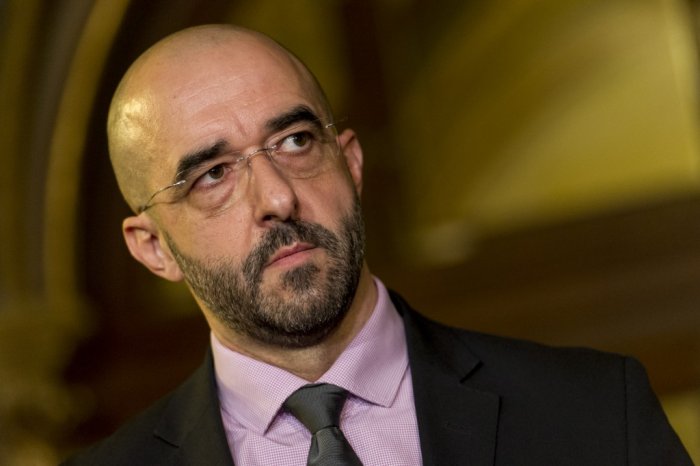Rule by Decree That Raised Concerns Seems set to End

Károly Árvai/Prime Minister’s Office
In its attempts to keep the spread of coronavirus at bay, Hungary introduced a state of emergency in March in which Parliament allowed the prime minister to rule by decree. With that, criticism over the rule of law in the country, a topic widely discussed in past years, reignited. Parliament is expected to vote on ending the state of emergency, and rule by decree, on June 20.
Minister of State for International Communication and Relations Zoltán Kovács has made a strong defense of Hungaryʼs rule by decree approach. Photo by Károly Árvai/Prime Minister’s Office.
As this article was being prepared, the United States passed a grave milestone: 100,000 confirmed deaths relating to the novel coronavirus. In the EU27, this number passed 125,000. Although nations are cautiously easing restrictions and economies are hoping for some breathing space in which to recover, at the beginning of March, when COVID-19 started spreading in Europe, the outlook was gloomier.
Answering the spread of coronavirus, on March 11 the Hungarian government declared a state of emergency, with measures, clarified in government decrees, remaining in force until revoked. Under the constitution, the Hungarian government can call a state of emergency for 15 days. To extend that, two-thirds of the lawmakers need to vote for it in Parliament.
On March 23, the government submitted its request for an extension. Although a motion to vote on the bill in an expedited procedure did not get four-fifths support it needed to be discussed there and then, the house, where governing party Fidesz controls two-thirds of the votes, gave the green light to the bill six days later, on March 30.
Extraordinary times, by common consent, call for extraordinary actions. The Coronavirus Protection Act gave Hungary’s Prime Minister Viktor Orbán power to rule by decree (suspend some legislation, diverge from legal provisions, take extraordinary measures) in the interests of securing the life, health, property and rights of those living in Hungary, as well as to cushion the stability of the national economy.
The law provided leeway for canceling scheduled by-elections and prohibiting the scheduling of new by-elections and any local or national referendums. It also added some harsh-sounding provisions: prison penalty of one to eight years for the violation of isolation, up to a year for obstructing measures that aim to contain the spread of COVID-19 spread and up to three years for disseminating “false” or “distorted” facts that “incite unrest”.
Concerns Reignited
As the law did not include an expiry date on the prime minister’s power to rule by decree, bar the fact that legally the house, dominated by the governing party, could theoretically revoke it at any time, concerns about the rule of law in Hungary were reignited.
Opponents of the law, both domestically and abroad, voiced fears of critical journalists being muzzled and the governing party’s power being enhanced. The Economist portrayed the prime minister as a “Bond villain” and, in another article, compared his increase of power to that of Russia’s Vladimir Putin and Turkey’s President Recep Tayyip Erdogan.
The United Kingdom’s left-leaning daily Guardian on March 31 quoted Sophie in’t Veld, a Dutch liberal MEP, who chairs the European parliament’s rule of law group, as saying, “Viktor Orbán has completed his project of killing democracy and the rule of law in Hungary. Clearly, the actions of the Hungarian government are incompatible with EU membership.”
The paper added that Dacian Çiolos, a former Romanian Prime Minister and EU commissioner who now leads the liberal group, said it was “shameful this dreadful corona is abused in such a manner.”
According to politico.eu, European Commission President Ursula von der Leyen issued a statement on March 24 calling for all emergency measures to be “limited to what is necessary and strictly proportionate” and not lasting indefinitely, though she did not mention Hungary by name.
In the United States, Eliot L. Engel, chair of the U.S. House of Representatives’ foreign affairs committee, was more explicit, saying Orbán was making “a blatant power grab in the face of the worst global health crisis in recent history.” He said the legislation marginalized the Hungarian parliament and allowed the prime minister “to rule by decree like a dictator.”
Writing on Twitter, former Italian Prime Minister Matteo Renzi wrote „after what Orbán has done today, the European Union MUST act and make him change his mind. Or, simply, expel Hungary from the Union.”
The Hungarian government’s international spokesman, Zoltán Kovács, said soon after the law made international headlines that media coverage had been “grossly distorting” of the facts, and blamed the sensationalism of newsrooms.
“This proposed law is like the sanction against falsely shouting ‘Fire!’ in a crowded movie theater. That’s the classic legal analogy for speech that is not protected because it is dangerous and false,” Kovács said, according to Hungarian state news agency MTI.
‘Reckless Speech’
“That’s what the proposed Hungarian law is saying, creating sanction for reckless speech that could impair or thwart efforts to protect people from the spread of the virus. We’re in a state of emergency, by the way. Lives are at stake. This gross distortion of the facts is biased and irresponsible,” he added.
In an interview with the British public interest broadcaster BBC on April 22, Kovács rejected allegations that the Coronavirus Protection Act would grant the government “unlimited” powers, adding that such a scenario would be “regrettable”.
In the interview with Stephen Sackur of the “Hardtalk” program, Kovács also dismissed allegations that Hungary heading toward a dictatorship as “ridiculous”, saying that it was a line of accusations the Orbán-led Fidesz government has been receiving for a decade.
Two busy months have passed since the law was enacted, almost three since coronavirus started its spread in Europe. Countries are now carefully easing isolation and social distancing restrictions, airports are beginning to reopen for travel and limited tourism in Europe soon, and hopes are high that we are over the worst of the virus, healthcare-wise. What will happen to the economy, though, is still highly uncertain.
Almost two months after the coronavirus law under fire had been approved, the Hungarian government submitted a bill on May 27 to put an end to its extraordinary powers. The authors of the bill acknowledged the criticism, albeit as a “coordinated political campaign” set to cause panic.
“Although these baseless attacks, fortunately, did not influence the success of the pandemic defense, all of those who questioned the extraordinary measures during the most difficult periods of the struggle and tried to undermine the legitimacy of government decisions will bear historical responsibility,” the authors of the bill say, as cited by the news agency MTI.
The vote on ending the state of emergency is to take place two weeks after the submission of the bill. Although a separate bill would serve to keep some provisional measures in force, such as keeping the coronavirus response body in place for the possibility of a second wave.
SUPPORT THE BUDAPEST BUSINESS JOURNAL
Producing journalism that is worthy of the name is a costly business. For 27 years, the publishers, editors and reporters of the Budapest Business Journal have striven to bring you business news that works, information that you can trust, that is factual, accurate and presented without fear or favor.
Newspaper organizations across the globe have struggled to find a business model that allows them to continue to excel, without compromising their ability to perform. Most recently, some have experimented with the idea of involving their most important stakeholders, their readers.
We would like to offer that same opportunity to our readers. We would like to invite you to help us deliver the quality business journalism you require. Hit our Support the BBJ button and you can choose the how much and how often you send us your contributions.










